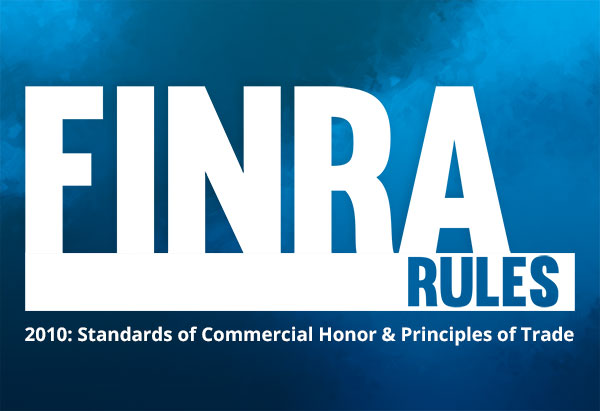What is FINRA Rule 2010?
 FINRA Rule 2010 is perhaps the single most important securities industry regulation. The rule requires that all industry members conduct business with high standards of commercial honor and that they maintain just and equitable principles of trade. The language used in this provision is intentionally broad.
FINRA Rule 2010 is perhaps the single most important securities industry regulation. The rule requires that all industry members conduct business with high standards of commercial honor and that they maintain just and equitable principles of trade. The language used in this provision is intentionally broad.
Essentially, Rule 2010 is FINRA’s ‘catch all’ provision. It can be used to enforce unethical broker or brokerage firm conduct that might not be a direct violation of any other rule. Here, our dedicated investment fraud lawyers explore what exactly the concepts of ‘commercial honor’ and ‘equitable trade’ mean in the financial services industry.
Browse Securities Industry News Involving FINRA’S Rule 2010
- FINRA FINES BOLTON CAPITAL; CUSTOMER RECORDS EXPOSED IN A DATA BREACH (2/28/2024)
- Amgen Securities Fraud Class Action Lawsuit (4/3/2023)
- Jeffrey Donald Noard, Broker with Emerson Equity, Named in Customer Dispute Alleging Various Forms of Misconduct (3/20/2023)
- Garrett Wayne Moretz, Broker with Lifemark Securities, Named in Customer Dispute Alleging Unsuitable Recommendations in GWG L-Bonds (2/28/2023)
- Suihock Goy, Broker with NI Advisors, Named in Customer Disputes Alleging Unsuitable Investment Recommendations in GWG-L Bonds (2/16/2023)
The History of Rule 2010
FINRA Rule 2010 developed out of regulations and principles contained within the Securities Exchange Act of 1934; more specifically, provisions within the legislation that required standards of commercial honor to be upheld by all members operating within the securities industry.
FINRA has promulgated regulations that explicitly prohibit many different types of broker misconduct. For example, a few of the most frequently cited rules include:
- FINRA Rule 2111, which requires that brokers only recommend suitable investments;
- FINRA Rule 5270, which prohibits the front running of block transactions; and
- FINRA Rule 5240, which prohibits coordination between firms.
However, unlike these rules, Rule 2010 is not narrowly tailored to address a specific type of misconduct. Instead, it is a broad enforcement that can be used to hold parties responsible for unethical behavior that does not quite fit into any specific category.
A Catch All Provision
As the Securities and Exchange Commission (SEC) explicitly noted in its proposal for rulemaking, Rule 2010 and other related regulations are necessary to protect investors and the industry as a whole. The rule does this by stopping dishonest practices that harm individual investors and the overall viability of the free and open securities market, but that may not violate any specific rules or regulations.
By crafting such a broad rule, the industry recognizes that it is not necessarily wise (nor even possible) to draft individual rules to address every type of theoretical misconduct. This is important. However, having a catch-all rule does also create some serious challenges. Indeed, it can be very difficult to pin down exactly what types of conduct actually violate Rule 2010.
Examples of Conduct that Violate Rule 2010
Ultimately, the most important thing to know about Rule 2010 is that it is applied on a case-by-case basis. In other words, to determine if Rule 2010 was actually violated, FINRA arbitration panels, the SEC and the courts will need to assess both the totality of the circumstances and the context in which the alleged misconduct occurred.
That being said, we are not flying blind when it comes to Rule 2010. We can get a fairly decent general view of the types of conduct that violate rule 2010 by reviewing some recent cases. For example, in the past few years, the following types of actions have been deemed to be violations of Rule 2010:
- The misappropriation of company or client funds;
- The sharing of a customer’s confidential information without their approval;
- Improper solicitation donations or solicitation for other personal benefits;
- Passing bad checks or forging signatures;
- Alterations to important financial documents; and
- Failure to disclose material information.
Fairness Matters
If you lost money because of the actions, or inactions, of your financial advisor or your brokerage firm, and you believe that you were treated unethically or unfairly, you need to have your case reviewed by an experienced securities fraud attorney. This is true even if you cannot articulate exactly why you feel that you were treated unfairly. In some cases, massive financial fraud has been uncovered only because a victim finally came forward and sought investigation into their advisor’s ‘suspicious behavior’.
What makes Rule 2010 so valuable and important is also what makes it so difficult to apply to individual cases. Investors who feel that they were mistreated deserve to have their claim investigated. Only after reviewing the unique facts of your case will an attorney be able to determine if you have a Rule 2010 claim.
We Protect Investor Rights
At the Sonn Law Group, our investor losses attorneys have extensive experience handling investment fraud claims. If you believe that a broker violated FINRA Rule 2010, and you lost money as a result, we can help. Please call our team today at 1-877-959-6467 to request a free initial review of your case.
From our offices in Aventura, Florida, Orlando, Miami, Boca Raton and Houston we represent investors throughout the United States and around the world.
CONTACT US FOR A FREE CONSULTATION
Se Habla Español
Contact our office today to discuss your case. You can reach us by phone at 844-689-5754 or via e-mail. To send us an e-mail, simply complete and submit the online form below.

